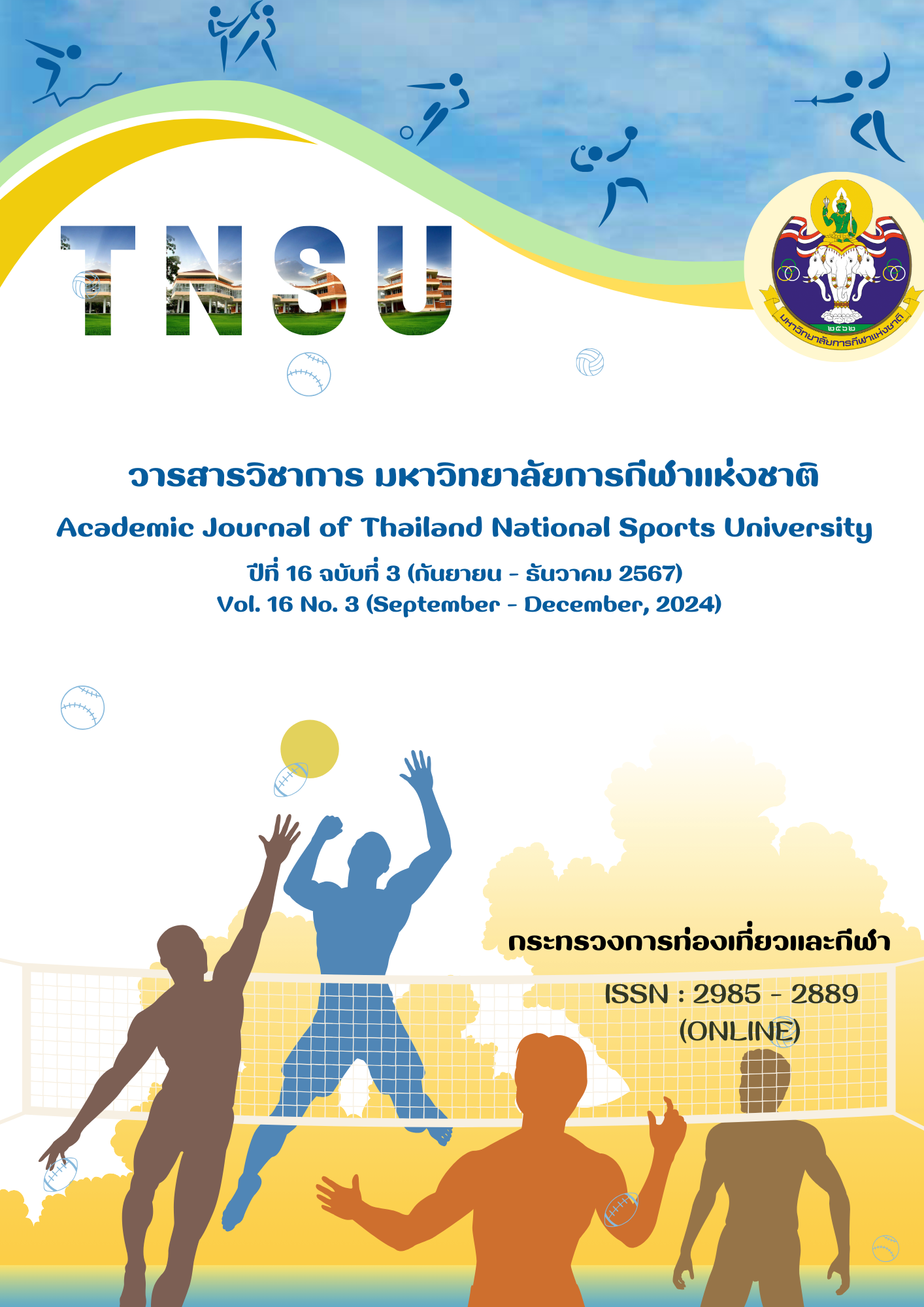EFFECTS OF LEARNING ACTIVITIES USING SELF – EFFICACY AND ACTION LEARNING THEORIES ON NUTRITION - EXERCISE BEHAVIORS FOR SECONDARY SCHOOL STUDENTS
Main Article Content
Abstract
This research aims to 1) compare the mean scores of nutrition - exercise behaviors, and 2) compare the mean scores of nutrition-exercise behaviors after the experiment between the experimental group and the control group students. The samples were a simple random sampling of 40 junior high school students was cursed, they were divided 20 into 20 students on an experimental group that received learning activities using self - efficacy and action learning, and another 20 students into a control group that received normal learning activities by simple random sampling. Research tools were 1) 8 eight plans of learning activities on nutrition and exercise using self - efficacy and action learning (IOC. between 0.90 and 1.00), 2) the nutrition - exercise behaviors assessment scale, and 3) the nutrition-exercise behaviors assessment questionnaire. The duration of the research was 8 weeks. Data were analyzed by means, standard deviation and t - test. The results showed that 1) the mean scores of nutrition-exercise behaviors of the experimental group after the experiment were significantly higher than before (p < 0.05), 2) the mean scores of nutrition - exercise behaviors of the experimental group after the experiment were significantly higher than the control group. (p < 0.05)
In conclusion: learning activities using self-efficacy and action learning had an impact on the nutrition-exercise behaviors of secondary school students.
Article Details

This work is licensed under a Creative Commons Attribution-NonCommercial-NoDerivatives 4.0 International License.
The published article is a copyright of the Academic Journal of Thailand National Sports University. The passage appeared in each article in this academic journal is a perspective of each author which is not related to the journal. Each author is required to be responsible for all components of his/her own article. If there are any mistakes, each author must be responsible for those mistakes on his/her own.
References
Bandura, A. (1986). Social foundations of thought and action: A social cognitive theory. Englewood Cliffs, NJ: Prentice-Hall.
Division of Non-Communicable Diseases, Department of Disease Control. (2019). Situation report on NCDs, diabetes, hypertension and related risk factors, 2019. Retrieved from https://shorturl.asia/B9uS0
Evans, R. (1989). Albert bandura: The man and his ideas-A dialogue. New York: Praeger.
Institute for Population and Social Research. (2019). Research report of the behavior monitoring project on physical activity of the Thai population 2019. Nakhon Pathom: Institute for Population and Social Research. Mahidol University.
Kornkan Rassameesoraj, & Jintana Sarayuthpitak. (2018). Effect of the practical learning process on nutrition toward analytical thinking and adequate food selection for seventh grade students (Master's thesis), Chulalongkorn University.
National Statistical Office. (2017). The 2017 food consumption behavior survey. Bangkok: National Statistical Office.
National Statistical Office. (2018). Socio - cultural and mental health survey 2018. Bangkok: National Statistical Office.
Nattapong Chaisangprateep. (2016). To study learning by doing in TMT423 research methodology for tourism industry. VRU Research and Development Journal Humanities and Social Science, 11(2), 93 - 102.
Orawan Noiwat, & Araya Prasertchai. (2015). Effects of a health promotion program on health behaviors. among the elderly in Nonthaburi province. Ratchapruek Journal, 13(1), 36 - 45.
Phattrut Nammueang. (2014). The development of learning achievement in single accounting system and products. By organizing learning by doing teaching activities with the principle of 5 Kor (Classroom research). Business Administration Majoring in Accounting, Rajamangala University of Technology Rattanakosin Bophitphimuk Chakrawat Campus.
Pongvipa Taweelaphorn. (2016). A study of teaching and learning with a practical approach to develop learning achievement in construction drawing 3 of 2nd year vocational certificate students at Metro Technology College. Class Research, Metro College of Technology, Chiang Mai.
South Australia Health. (2022). The risks of poor nutrition. Retrieved from https://shorturl.asia/H6bsF
Umaporn Krutsiri. (2020). The effect of a health promotion program on knowledge. Self - efficacy and self - care behaviors in new cases of pulmonary tuberculosis Ban Pong Hospital. Journal of Health Promotion and Quality of Life Research, 1(2), 24 - 34.
World Health Organization. (2020). Physical activity. Retrieved from https://shorturl.asia/x1tfi


